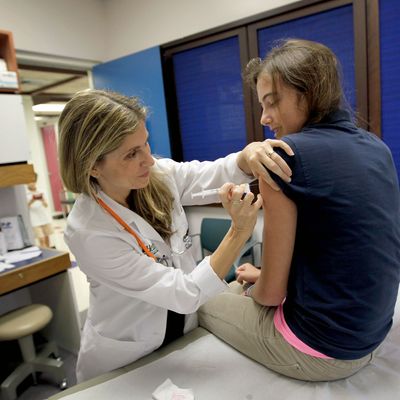
It’s been almost 10 years since the vaccine for human papillomavirus (HPV) became available, and even though vaccination rates are much lower than doctors would like, the shot has still lowered HPV infections in teen girls by 64 percent.
HPV is a sexually transmitted disease that can cause genital warts, yes, but certain strains can also cause cancers of the cervix, vagina, vulva, anus, penis, or head and neck. This makes the HPV vaccine one of just two cancer-preventing vaccines approved in the U.S. (Every year, 27,000 Americans — men and women — are diagnosed with a cancer caused by an HPV infection, per the Centers for Disease Control and Prevention.)
Still, some parents have been reluctant to give their children the vaccine starting at age 11 or 12, when it’s recommended, as they feared it would make their tweens more promiscuous. That concept has been proven to be straight-up false.
Let’s hope this news helps. For a study published in the journal Pediatrics, researchers from the CDC looked at HPV infection rates in teen girls and young women before and after the introduction of the vaccine in 2006 (it wasn’t recommended for boys until 2011). Specifically, they compared the time frames of 2003–2006 to 2009–2012. In girls ages 14 to 19, prevalence of the strains of HPV targeted by the vaccine fell from 11.5 percent to 4.3 percent — a 64 percent reduction. In young women ages 20-24, rates of infection dropped from 18.5 percent to 12 percent. The researchers expect that in the future they’ll see lower rates of pre-cancers, and eventually, cancers.
The stats are even more impressive when you consider that only about 40 percent of teen girls and 20 percent of teen boys have gotten all three doses of the vaccine. Both girls and boys need it, and they need it before they start having sex.
If sex talk is too awkward for doctors (and studies have shown that it very well may be), can we all agree to frame the HPV vaccine as routine cancer prevention?

